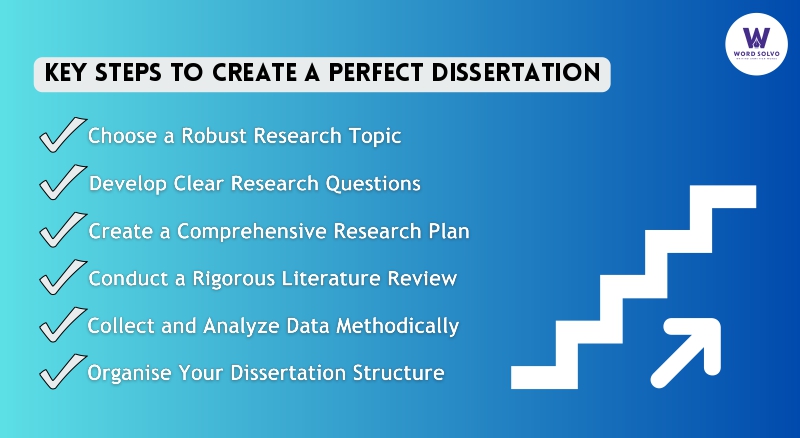A dissertation is the pinnacle of academic achievement, representing the culmination of years of research, analysis, and dedication. As you embark on this intellectual journey, you'll find that crafting a sound dissertation requires meticulous planning, disciplined execution, and a deep commitment to academic rigour.
In this guide, we'll explore the key steps to create a perfect dissertation that not only meets the highest standards but also contributes meaningfully to your field of study.
1. Choose a Robust Research Topic
The foundation of a sound dissertation writing lies in selecting a research topic that is both relevant and significant to your field. Your topic should be well-defined, focused, and aligned with your academic interests. Conducting a thorough literature review to identify gaps in existing research can help pave the way for your unique contribution.
2. Develop Clear Research Questions
Crafting a clear and concise research question would serve as the cornerstone of your dissertation. This question should be specific, measurable, and capable of guiding your research journey. A well-defined research question helps you maintain focus and clarity throughout the process of dissertation writing.
3. Create a Comprehensive Research Plan
An organised research plan is essential for keeping your project on track. Not creating a comprehensive research plan is often the reason why students are unable to submit their dissertations on time.
Outline the research methods you'll use, the data collection process, and the timeline for each stage. A solid plan ensures that you allocate sufficient time to gather relevant data and analyse it thoroughly while proceeding with your dissertation writing.

4. Conduct a Rigorous Literature Review
A sound dissertation demonstrates a strong understanding of the existing body of knowledge in your field. Conduct an exhaustive literature review to identify relevant theories, methodologies, and findings. This review will guide your research and help you position your work within the larger academic conversation.
5. Collect and Analyze Data Methodically
Whether your research involves qualitative or quantitative methods, ensure that data collection is systematic and meticulous. Maintain detailed records of your data sources, methods, and any challenges you encounter. Analyse your data rigorously, using appropriate tools and techniques that align with your research question.
We have seen many students struggle with data collection and analysis as they might not have the proper training to perform these procedures. And starting the process of collecting and analysing data with a deadline coming close is even more stressful. Keeping the pain a student has to go through while dissertation writing and composing different types of academic work, Word Solvo offers the best dissertation writing service UK so that you know you are not alone in this journey.
6. Organise Your Dissertation Structure
A well-structured dissertation enhances readability and comprehension. Dividing your work into logical sections, including an introduction, literature review, methodology, results, discussion, and conclusion would help you allocate necessary word counts for each section.
Furthermore, it would also assist you in identifying which information needs to go in which section, thereby making it coherent and logical. Each section should flow seamlessly, guiding the reader through your research journey.
However, if you feel like you are not sure how to structure and categorise the collected information you can always rely on our experts to offer the best dissertation writing service UK. However, if you are enrolled in any other universities in any other country, we can still help you with dissertation writing help by catering to your specified needs.
7. Craft a Compelling Introduction for Your Dissertation Writing
Your dissertation's introduction should succinctly present your research question, its significance, and your approach to addressing it. A compelling opening helps in hooking the reader and provides context for your study. Clearly outline the structure of your dissertation writing to help readers navigate your work.
8. Present a Thorough Literature Review
In the literature review section, synthesise and critique existing research relevant to your topic. Use your notes taken prior during research the previously published papers and highlight gaps, contradictions, and debates within the literature. This section demonstrates your command over the existing scholarship and sets the stage for your original contribution. You can also ask our experts for dissertation writing help if you find yourself struggling while dissertation writing.
9. Explain Your Methodology for Writing a Perfect Dissertation
Detail the research methods you employed and explain why they are appropriate for your research question. Justify your choices and provide a step-by-step account of data collection and analysis as it helps the readers understand the relevance, validity and accuracy of the research. This section showcases your research skills and helps readers evaluate the validity of your findings.
10. Present and Analyse Your Findings
In the results section, present your research findings objectively and concisely. Use tables, graphs, and visual aids to enhance clarity. In the subsequent analysis section, interpret your findings, relate them to your research question, and discuss their implications for writing your perfect dissertation.
11. Engage in Thoughtful Discussion
The discussion section is your opportunity to contextualise your findings within the broader academic landscape. Interpret the significance of your results, draw connections to existing research, and offer insights into the implications of your work. Address limitations and suggest areas for future research.
12. Conclude with Conviction
In your conclusion, restate your research question and summarise your main findings. Connect your research objectives with the findings of Literature Review and primary research to restate the research questions.
Emphasise the original contribution your work makes to the field. Avoid introducing new ideas—instead, reflect on the broader implications of your research and the potential impact on your discipline.
13. Edit, Revise, and Proofread for Making a Perfect Dissertation
A sound dissertation is polished and error-free. Set aside time for multiple rounds of editing and proofreading. Check for grammatical errors, clarity of expression, consistency in formatting, and adherence to citation styles for making your dissertation as perfect as it can be!
14. Seek Feedback
Involve mentors, advisors, and peers in the review process. Their feedback can offer fresh perspectives and identify areas that need improvement. Constructive criticism helps refine your work and enhance its quality and help create a perfect dissertation.
15. Reflect on Your Journey
After completing your dissertation, take a moment to reflect on your academic journey. Consider the challenges you overcame, the insights you gained, and the growth you experienced as a researcher. Your dissertation is not just a document; it's a testament to your dedication and intellectual journey.
Crafting a sound dissertation demands dedication, intellectual rigour, and a commitment to academic excellence. By selecting a robust research topic, conducting thorough research, and adhering to a structured writing process, you can create a dissertation that contributes meaningfully to your field and stands as a testament to your scholarly endeavours.
Remember that a sound dissertation not only marks the culmination of your academic journey but also lays the foundation for your future contributions to knowledge. If you, however, feel at a point of your dissertation writing that you might need help, you can always rely on Word Solvo- the best dissertation writing service UK for getting dissertation writing help even with a 48-hour deadline.

